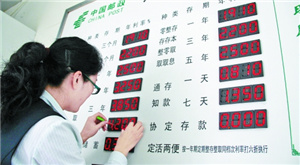Gov't makes further cuts to boost efficiency
China Daily, June 5, 2014 Adjust font size:
In an effort to improve government efficiency, the State Council's executive meeting decided on Wednesday to abolish or delegate 52 items of administrative procedures previously subject to the State Council's review.
These administrative procedures, as part of the 200 items that Premier Li Keqiang proposed cutting this year in his annual work report, will streamline the administration for investors and business startups, create job opportunities and ensure that favorable policies make full use of innovation in the market, according to a statement released after the meeting.
For example, the application for preferential tax rates of small- and microsized companies and businesses offering job opportunities to laid-off workers will be streamlined to simplify tax reduction procedures.
The government will continue to reduce the number of items subject to government approval before starting a business and release details about those items to the public for supervision, the statement said.
"We must prevent reform dividends from being intercepted," it said.
The central government has pledged to streamline business procedures by cutting bureaucratic inefficiency since last year.
It abolished or delegated to lower-level governments 416 items previously subject to State Council review and approval in 2013. It revised the list of investment projects requiring government review and streamlined the business registration system.
A total of 348 administrative fees were either canceled or exempted, thus reducing the burden on businesses by more than 150 billion yuan ($24 billion), according to the government's 2013 work report. As a result, the number of newly registered businesses increased by 27.6 percent nationwide, and private investment accounted for 63 percent of the country's total investment last year.
Wednesday's meeting also discussed the geographic layout for petrochemical industry development, a plan currently being drafted by the National Development and Reform Commission.
Cai Ronghua, an official from the NDRC, told Xinhua News Agency that the plan aims to "scientifically adjust the distribution of the petrochemical industry" to maintain sustainable development of the industry.
Although the State Council's meeting did not release details of the plan, it stressed that the plan must be followed strictly once being settled.
As for the increasing number of protests against petrochemical projects, such as PX (paraxylene) plants, in recent years, the meeting also urged local governments to respond to concerns from the public.


